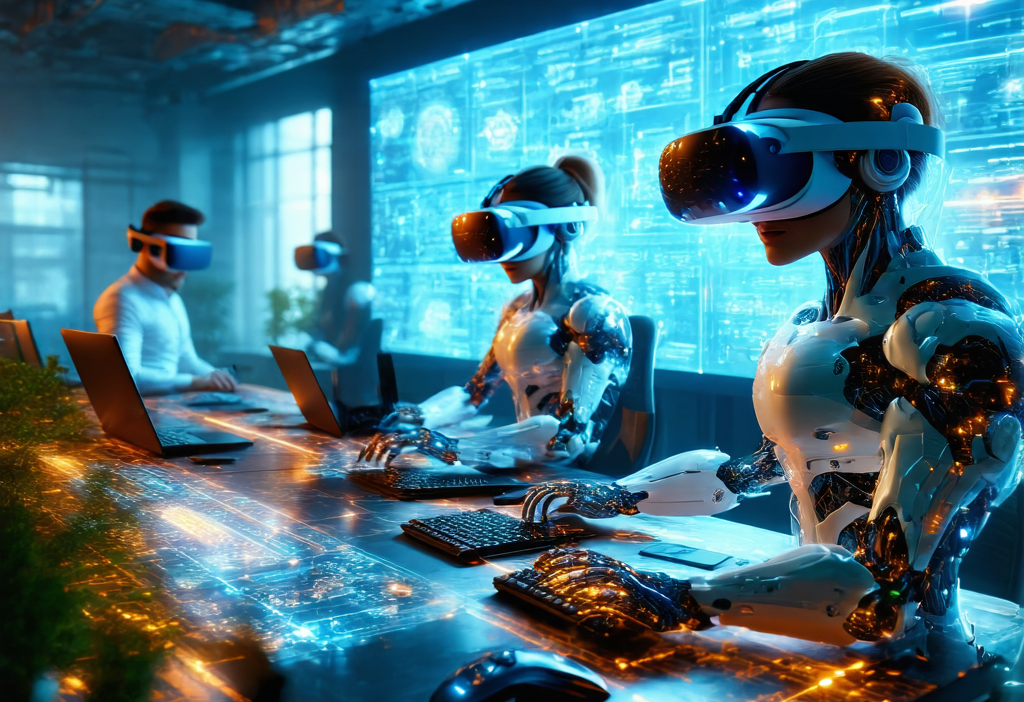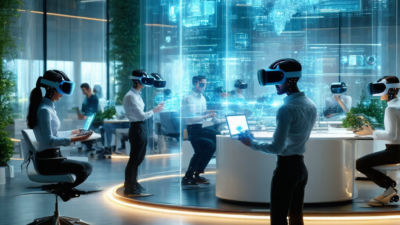The Future of Work: How AI Transforms Business Operations in 2025
As we stand on the brink of 2025, artificial intelligence (AI) is poised to redefine how businesses operate. This blog explores the transformative impact of AI across various facets of business operations, offering insights into how companies can adapt and thrive in this new era.
1. Enhancing Productivity with AI
One of the most significant contributions of AI is its ability to boost productivity. By automating repetitive tasks and streamlining workflows, businesses can allocate resources more effectively. For instance, chatbots enhance customer service by providing instant responses, while predictive analytics optimizes inventory management.
- Automation of routine tasks reduces human error and saves time.
- Predictive analytics helps in forecasting market trends accurately.
- AI-driven tools like chatbots improve customer engagement and satisfaction.
2. Revolutionizing Decision-Making
Data is the lifeblood of modern businesses, and AI excels at transforming raw data into actionable insights. Machine learning models analyze vast datasets to uncover patterns and trends, enabling informed decision-making. For example, AI can predict consumer behavior, helping companies tailor their marketing strategies effectively.
“AI doesn’t replace human intuition but enhances it by providing data-driven insights.”
3. Transforming Customer Experience
The customer experience is at the heart of any successful business, and AI plays a pivotal role in personalizing interactions. From personalized recommendations on e-commerce platforms to dynamic pricing strategies, AI ensures that customers receive tailored experiences.
Dynamic Pricing: Algorithms adjust prices based on real-time demand, ensuring optimal revenue generation.
Personalization: AI analyzes user behavior to offer customized product suggestions, enhancing customer satisfaction and loyalty.
4. Redefining Human Resources
AI is revolutionizing HR practices by simplifying recruitment processes, improving employee engagement, and facilitating talent development. For instance, AI-powered platforms can sift through numerous resumes to find the best candidates efficiently.
- Talent Acquisition: Streamlined recruitment processes save time and resources.
- Employee Engagement: AI tools monitor employee sentiment and provide feedback for better engagement strategies.
5. Fostering Innovation
Innovation is the cornerstone of business growth, and AI acts as a catalyst in this process. By analyzing market trends and consumer needs, AI identifies opportunities for product development and service innovation. Startups leveraging AI gain a competitive edge by quickly bringing innovative solutions to market.
6. Addressing Challenges
Despite its benefits, integrating AI into businesses comes with challenges. Issues like data privacy, ethical concerns, and workforce adaptation require careful consideration. Ensuring transparency in AI algorithms is crucial for maintaining trust among customers and employees.
Data Privacy:
Protecting sensitive information is paramount. Implementing robust security measures can mitigate risks associated with data breaches.
Ethical Considerations:
Fairness and bias in AI algorithms must be addressed to ensure equitable outcomes.
7. The Road Ahead
Embracing AI is no longer optional; it’s a necessity for businesses aiming to stay competitive. Companies that invest in AI capabilities will likely emerge as industry leaders. Collaborating with technology providers and fostering an innovative culture can accelerate this transformation.
Investing in AI:
Allotting resources for AI research and development is essential for long-term growth.
Cultural Shift:
Promoting a culture that embraces change and innovation within the organization facilitates smoother integration of AI technologies.
Conclusion
The future of work is undeniably intertwined with AI. By harnessing its potential, businesses can unlock new avenues for growth and efficiency. The key lies in strategic implementation, ensuring that AI complements human capabilities rather than replacing them. As we navigate this exciting era, the synergy between human ingenuity and artificial intelligence will shape a brighter future for work and business operations.





